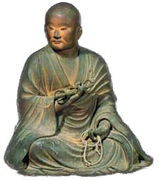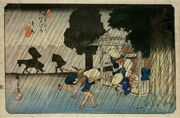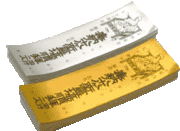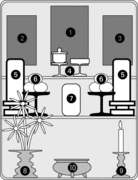Pilger-Outfit (Bildseite)
Zur Navigation springen
Zur Suche springen

Größe dieser Vorschau: 377 × 599 Pixel. Weitere Auflösungen: 151 × 240 Pixel | 645 × 1.024 Pixel.
Originaldatei (645 × 1.024 Pixel, Dateigröße: 225 KB, MIME-Typ: image/jpeg)
Bildseite:Pilger-Outfit
- Ian Reader, Nanzan Institute for Religion and Culture. Letzter Zugriff: 2020/9/8
Der Religionswissenschaftler Ian Reader beschreibt sein Bild selbst folgendermaßen:
- Pilgrims usually dress in white — signifying both the colour of purity and death. Usually they wear a white shroud (hakui 白衣) that indicates they are a pilgrim and that also symbolically is their burial shroud. The traditional headgear is a monastic style hat or kasa 笠 that not only protects against rain and sun but also symbolises the pilgrim's coffin and that has a funerary inscription on it. Pilgrims also carry a staff, tsue 杖, to help with walking, and that also serves as a symbolic gravestone; in earlier eras when pilgrims died on the route, they would be interred and their staff left to mark the site. Symbolically, thus the pilgrim was “dead to the world” while on the route; completion implied rebirth. The staff also symbolizes the body or presence of Kōbō Daishi who according to pilgrimage belief accompanies every pilgrim. In effect, too, the clothing resembles that of Kōbō Daishi, who provides the archetypal model for pilgrims in Shikoku. Many pilgrims also carry a variety of items such as rosaries, bells and a white bag to carry osamefuda 納め札 (pilgrims' calling cards), which bear their names and usually an image of Kōbō Daishi, and that are left at the temples they visit and are also given to people met along the way.
- This pilgrim is unusual in dressing entirely in white; nowadays most pilgrims opt for the white shroud, staff and more convenient modern clothing and headgear. There is no prescribed apparel that must be worn, however, and pilgrims are free to choose the clothing they feel most suited to their pilgrimage.
Bildverwendung:
- Pilgerschaft (Kapitel „Alltag“)
Religion-in-Japan❯Bild
Dateiversionen
Klicken Sie auf einen Zeitpunkt, um diese Version zu laden.
| Version vom | Vorschaubild | Maße | Benutzer | Kommentar | |
|---|---|---|---|---|---|
| aktuell | 13:42, 18. Apr. 2014 |  | 645 × 1.024 (225 KB) | Bescheid (Kommentar | Beiträge) |
:
Dateiverwendung
Die folgenden 4 Seiten verwenden diese Datei:



